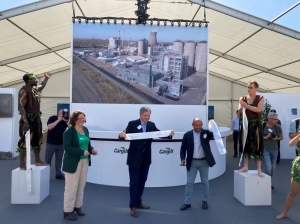


(Posted on 26/06/22)
Cargill has opened its first state-of-the-art biodiesel plant that converts waste oils and fats into renewable fuel at its Ghent facility in North Sea Port. The biodiesel is destined for shipping and freight, helping reduce their carbon footprint.
Dry bulk accounts for 51% of the transhipment of goods by sea-going vessel in the North Sea Port area.
Cargill is investing $150 million in its existing oilseed and biodiesel plant in Ghent, taking a first step in the production of advanced biodiesel. The new facility will produce up to 115,000 tons per year, equivalent to the annual consumption of 10,000 trucks or 150,000 cars. This will create 20 new direct jobs and 60 indirect jobs at the Ghent plant. "This investment in a completely new circular plant strengthens North Sea Port's position in terms of alternative fuel production," says North Sea Port CEO Daan Schalck.
This project is Cargill's first to convert waste to biofuel and one of the largest such facilities in Europe. Using state-of-the-art technologies, the US food multinational's plant transforms all kinds of waste liquid oils and fats into advanced biodiesel. These include used cooking oils, tallow and residues from the production of edible oils. In this way, Cargill is supporting the circular economy by upgrading products that were previously discarded or destined only for low-value applications. In doing so, the company aims to fulfil its aims of reducing greenhouse gas emissions and promoting circular fuels.
"With this advanced waste treatment technology, we are offering an innovative solution that meets the global demand for renewable energy, respects environmental requirements and helps customers meet their greenhouse gas commitments”, says Alexis Cazin, Managing Director for Cargill Biodiesel & Carbon EMEA, who had travelled to Ghent especially for the opening. For Europe, Cargill's advanced biodiesel is an important step forwards in addressing this challenge. In the past, it has proved particularly difficult to develop low-carbon renewable fuels for shipping and heavy freight, even though transportation accounts for nearly a quarter of Europe's greenhouse gas emissions.
With this year’s Rail Conference “Rail Freight Transport and Seaports”, a joint initiative... Read more
Asian Bulk Logistics (ABL Group) and ICG have jointly announced the successful completion of ABL&rsquo... Read more
Abu Dhabi based AD Ports Group, a leading global enabler of integrated trade, industry and logistics... Read more
The Executive Board of Hamburger Hafen und Logistik AG (HHLA) has appointed Patrick Krawutschke as Managing... Read more
Abu Dhabi based AD Ports Group, a global enabler of integrated trade, transport, industry, and logistics... Read more
This year marks a significant milestone in maritime innovation as Port Hedland, Australia, celebrates... Read more
Associated British Ports (ABP), the UK’s leading port operator, has announced the latest tranche... Read more
During the Investment, Labour, and Trade Promotion Programme in Japan (November 16–22, 2025),... Read more
AD Ports Group subsidiary Khalifa Economic Zones Abu Dhabi - KEZAD Group, the largest operator of integrated... Read more
Abu Dhabi based AD Ports Group, a global enabler of integrated trade, transport, industry, and logistics... Read more